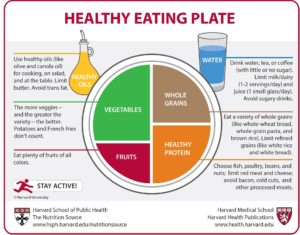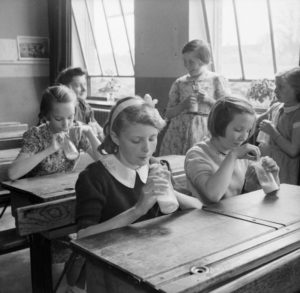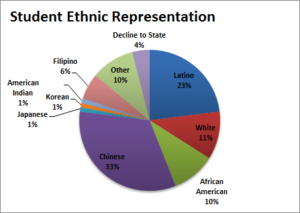A tall glass of milk is more American than apple pie. Generations of Americans of all races, ethnicities and classes have been taught that we must drink milk and eat dairy products several times a day to be healthy.
While this idea is normally accepted as truth, in recent years, it has been challenged. An increasing number of reputable health professionals have pointed to milk as a source of disease, not health. According to the Harvard Medical School, there is considerable evidence that dairy intake can increase the risk of heart disease, ovarian cancer and prostate cancer, with little to no evidence that it protects against osteoporosis.

What’s for sure is that milk is not necessary. Through deft and sustained marketing, milk has been positioned as an entirely unique and wonderful food in the American mind and kitchen, but the truth is that it does not provide any nutrient that isn’t abundantly available in the rest of our food supply.
Despite the mounting evidence against milk consumption, the belief that milk is necessary is catching on worldwide. In the past few decades, populations that had no prior culture of milk consumption have started to aggressively integrate milk into the daily meals of children. Western levels of consumption are seen as the ideal to strive for. This requires a fundamental shift in food cultures, but engineering this shift is not all that difficult because children are malleable and schools are an incredibly powerful locus of influence.
Indeed, milk distribution in schools is the primary channel through which children in countries with no prior dairy culture are taught to drink milk. By shaping the tastes, beliefs and norms of children, a whole generation of future consumers is created. This is presented as a positive for the population: akin to introducing children to the joy of physical activity, teaching them to drink milk is packaged as setting them on the path for a healthy life. The premise that without milk, children in China (for example) can’t be healthy is misguided and ethnocentric, to put it mildly.
Back in the United States, the importance of milk is reaffirmed to every new generation and school lunches remain an important tool. New generations are taught that milk is a food group unto itself. Children of racial and ethnic minorities, whose traditional food cultures include diverse and abundant sources of calcium, are made to believe that only milk is an appropriate source of calcium.

Non-white children are disproportionately impacted by the pro-dairy agenda of our public school meal system. They are more likely to become lactose intolerant than white children because lactose tolerance—or lactase persistence—only developed as a dominant feature in a few populations with long histories of dairying, most of which are European. Lactose intolerance, whereby one stops producing lactase after weaning, is the norm in most populations. When lactase production stops, consuming lactose can lead to digestive problems like abdominal pain, diarrhea and bloating. More worrying, dairy consumption can impede nutrient absorption in lactose intolerant people.
Like soda, the liquid calories in milk contribute significantly to caloric intake. Coupled with a high-fat content, milk is linked to growing rates of obesity and diabetes. Adding milk to school meals is particularly harmful to communities overburdened by high rates of these diseases, like the Latino and African-American communities. While some efforts have been made to rid school meals of liquid calories like soda and fruit juice, milk has largely been ignored.

The harm done to children of color by Eurocentric school meal policies is compounded by the fact that they are much more likely to be on the receiving end of these policies. In the San Francisco Unified Public School District, Asian and Latino children make up the majority of the student body, while only 11% of the students are white. While cow’s milk presents health risks to all children, those to whom it is likely to cause the most damage are the very same children who are encouraged to drink it on a daily basis through school meals.
The National Institute of Health recommends serving water in school rather than cow’s milk, juice, soda or any other sugar-laden beverage. Seed the Commons fully backs this proposal and we believe it can be an effective first step in reforming school meals so that they set children up for a lifetime of health. As we teach children to drink water and get their calories from food, we should also introduce them to an abundant variety of plant-based sources of calcium and other essential nutrients. Ideally, healthy school meals would be connected with school gardens, the number of which has been growing in the Bay Area. Parents would be invited to share traditional recipes and introduce lesser known herbs and vegetables to school gardens or greenhouses, so as to preserve and tap into the wealth of culinary traditions and nutritional knowledge present in our diverse city.
So, let’s get to work! Today, March 9, is International School Meals Day. Let’s seize this opportunity to state loud and clear that the purpose of school lunches is to provide all children with healthy food. Let’s state that school meal policies will be guided by the best interests of children, not private interests nor Eurocentrism. Let’s remove milk from public school meals.
There’s just one problem: federal requirements connect school meal funding with milk distribution. While kids may still opt-out with a doctor’s note, the normal milk is only replaced by lactose-free milk instead of healthier sources of calcium. The result is the reinforcement of milk as an essential source of nutrition, erasing other food cultures and setting up children for future health problems. This is an unfair and biased requirement that serves the interests of the dairy industry to the detriment of our city’s children.
Through forward-thinking policies like the recently passed Soda and Sugary Beverage Tax and the Good Food Purchasing Policy, San Francisco has shown itself to be progressive when it comes to our children’s diet. Removing milk from our children’s school meals is just as important and we believe San Francisco can once again lead the way. That is why Seed the Commons will begin advocating for the well-being of San Francisco’s children and urge the Board of Education to pass a resolution to remove milk from our children’s school meals.
[section background_image=”” text_color=”#666666″ background_color=”#eeeeee”][chimpy_lite_form][/section]
References
- Encouraging Consumption of Water in School and Child Care Settings: Access, Challenges, and Strategies for Improvement.
- Frequently Asked Questions in Pediatric Practice — Lactose Intolerance in Diarrhea.

